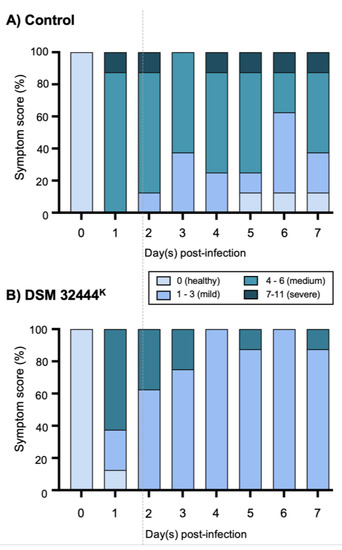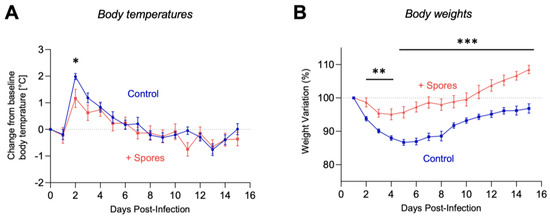Influenza remains a significant threat to human health with a substantial number of deaths each year. Vaccination has not been able to completely stop the virus’s evolution, and there is a need for next-generation prophylactic approaches. In this study, ferrets were intranasally administered inert bacterial spores (DSM 32444K) every 7 days for 4 weeks and then challenged with avian H7N9 influenza A virus. The results showed that dosing with Bacillus subtilis DSM 32444K significantly reduced the clinical symptoms of infection in the animals. While viral shedding was not completely prevented, the temporal kinetics were reduced. This suggests that nasal dosing with heat-stable spores could be a promising approach for influenza prophylaxis in both humans and animals, offering potential benefits in mitigating the impact of the virus.

Figure 1. Clinical signs, change in body temperature, and weight loss exhibited by ferrets treated with DSM 32444K (panel B) or mock-treated (panel A) with PBS following infection with H7N9 AIV. Ferrets were treated with 0.5 mL of DSM 32444K or PBS on four separate occasions, 7 days apart, followed by infection with H7N9 AIV 7 days after the last treatment. Individual values were plotted per animal, and lines indicate the mean values per group. All ferrets were scored for clinical signs daily following infection according to the clinical score system presented in Supplementary Table S1. The cumulative daily clinical scores were represented graphically.

Figure 2. Change in body temperature and weight loss exhibited by ferrets treated with DSM 32444K or mock treated with PBS following infection with H7N9 AIV. Ferrets were treated with 0.5 mL of DSM 32444K (red line) or PBS (blue line) on four separate occasions, 7 days apart, followed by infection with H7N9 AIV 7 days after the last treatment. Individual values were plotted per animal, and lines indicate the mean values per group. Body temperatures and weights taken 1 day prior to infection were used to configure a baseline, and then, temperatures (panel A) and weights (panel B) were taken daily following infection with H7N9 AIV. Statistical significance was determined using a two-tailed Mann-Whitney U test; panel A, * p < 0.05; panel B, ** p < 0.01, *** p < 0.001.
This study builds upon previous research, showing that intranasal dosing of mice with inert B. subtilis spores reduces symptoms of influenza. The study now uses the ferret model of influenza, which more closely mimics human infection. The data indicate that pre-treatment with inert spores leads to a clear reduction in the virulent and symptomatic stages of influenza, though viral shedding is not significantly affected.
The results suggest that inert spores may be useful for controlling influenza in humans and animals. The underlying mechanism is likely innate immunity, involving interactions with pattern recognition receptors (e.g., TLRs) and induction of pro-inflammatory cytokines. Bacterial spores are easily and cost-effectively produced, and their safety for human consumption is well-established. Considering the global impact of influenza and the potential for future pandemics, inert spores could be considered as a low-cost and pragmatic prophylactic measure, possibly as an adjunct to existing flu vaccines. The potential efficacy of inert spores against other viral pathogens is also worth exploring.














